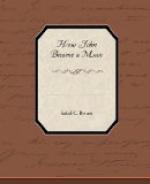This experience marked an awakening-time in all of the boys’ lives; at that moment their consciences, which had almost fallen asleep, were aroused, and in startling phrases gave them accounts of their evil deeds. With great haste the boys returned the weapons to their former hiding place, relocked the trunk, and in so far as it was possible, covered all the traces of the accident. Then, with hearts full of guilty thoughts, the three boys hastened from the place where a scene of horror had very nearly been enacted.
Out in the open, where the air was fresh and pure, their spirits to a certain degree revived. But their usual laughter, fun, and merry-making had been dampened; and as they wended their way to the prairie pasture-land, few words were passed between them. Poor little misguided boys! warned, and yet left so ignorant of what was the right and the wrong way.
Through the voice of conscience God endeavored to speak to John and to tell him that his ways were evil and that he and his cousins would some day get into serious trouble if they continued in the way they were going; but, although he was sad, he could not understand. He wanted to be a good boy for his father’s sake (for his father was the best friend he knew); and most of all he desired to become the man that that parent had wished him to be. John’s disregard for his father’s warnings from time to time had been due to the fear that, if he obeyed, his early manhood would be hindered.
Could that father have given his little son an object-lesson such as an aged monk once, while walking through a forest, gave his scholar, John might have been spared much suffering. The monk, stepping before four plants that were close by, pointed to the first, a plant just beginning to peep above the ground; to the second, one well-rooted in the earth; to the third, a small shrub; and to the fourth, a full-sized tree.
Then turning to his young companion, he said, “Pull up the first.” This the boy easily did.
“Now, pull up the second.” The youth obeyed, but not with so much ease.
“And now the third.” This time before the boy succeeded in uprooting the plant, he had to put forth all his strength and to use both his arms.
“And now,” said his master, “try your hand on the fourth.” But although the lad grasped the trunk of the tree in his arms, he scarcely shook its leaves; and he found it impossible to tear its roots from the earth. Then the wise old man explained the meaning of the four trials.
“This, my son,” he said, “is just what happens to our bad habits and passions. When they are young and weak, we can by a little watchfulness and by a little discipline, easily tear them up; but if we let them cast their roots deep down into our souls, no human power can uproot them. Only the almighty hand of the Creator can pluck them out. For this reason, my boy, watch your first impulses.”




